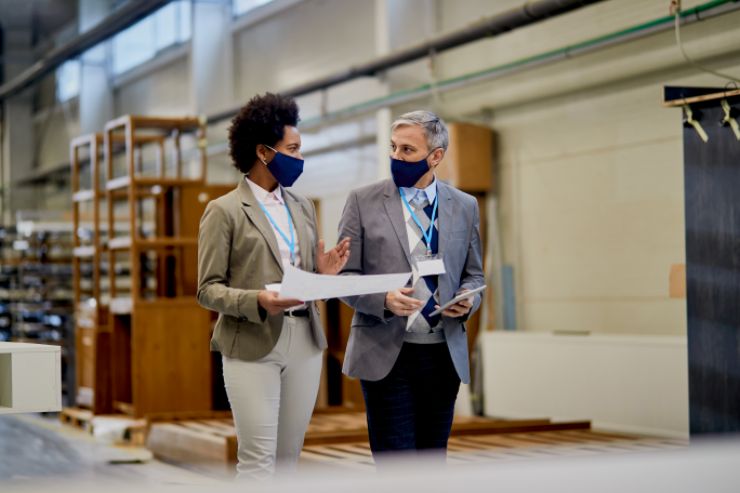The Importance of Facility Managers In A Post-Pandemic World

Facility management is an immensely important cost of doing business—one that can be easy to forget when everything is running smoothly. Facility managers are often responsible for overseeing commercial cleaning and maintenance activities. In some cases, that may even include small projects such as landscaping and floor cleaning services.
Some companies choose to keep facility management in-house—due to contract requirements or otherwise. Many companies, however, choose to outsource these services and maximize their time and operational efficiency. As an added bonus, outsourcing these services gives companies the advantage of high-end cleaning supplies and expertise without the upfront investment of buying these things directly.
How the Pandemic Shifted Company Focus
Pritchard Industries, like many other businesses, was impacted substantially by COVID-19. We had to change our operations to focus on health, safety, and employee health in ways not previously expected on such a large scale. Facility managers, now more than ever, are needed to ensure that buildings and facilities stay clean and safe.
Facilities such as restrooms, lobbies, and offices have served to spread COVID like a wildfire when left uncleaned for extended periods of time. To further compound matters, COVID has been spread through centralized ventilation shafts and other, similar means. Lacking restrictions on travel and sanitization have not helped effectively prevent the spread either.
What Do Facility Managers Really Do?
At a high level, facility managers are responsible for ensuring the safety and cleanliness of spaces, air, and water quality management, facilities emergency response, commercial cleaning and sanitization procedures, and more. Many businesses called on facility managers for operations such as installing sanitization stations and controlling the flow of people into and out of their buildings.
Air and Water Quality Management
Air quality management reaches far beyond simply cleaning air filters and spraying cleaners into the air. Facility managers are responsible for reducing the number of pollutants that enter the air, stripping them out of the air, and providing a clean supply of fresh air to the entire operation.
This includes tasks such as vacuuming, window washing, changing air return filters regularly, and using cleaning solutions on high-traffic surfaces to prevent the circulation of microbes, pollutants, dust, dirt, and other things that no one wants to breathe.
Facility Emergency Management
When businesses are exposed to risk—hazardous material leaks, spills, and other emergencies—facility managers are responsible for designing the action plans that enable businesses to stay on track. This may include establishing protocols for contacting EMS, police, fire, and other emergency services.
Since COVID, this also includes monitoring and enforcing interpersonal policies such as mask requirements, regular sanitization and cleaning operations, and other hygiene-related tasks.
Safety is Becoming Fundamental In The Workplace
Safety in the workplace is paramount to ensure continued operations. Modern employees are often wary of employers that don’t enforce provisions to keep them safe. This includes companies that lack efficient remote work policies, social distancing requirements, and mask guidelines.
Most companies are developing and implementing these sorts of protections, infrastructure, and fundamentals. Organizations such as the Global Biorisk Advisory Council (GBAC) and Worldwide Cleaning Industry Association (ISSA). These organizations, in conjunction with the CDC are providing guidelines that can empower businesses to comply with local, national, and regional health regulations. They’re also ensuring businesses are prepared in case of another pandemic.
Keeping your Business Safer Going Forward
Facility Safety Assurance (FSA) includes developing plans for commercial cleaning and sterilization, air and water quality maintenance, emergency response planning, and more elements indoors. Many industrial and commercial cleaning companies are also versed in hazardous materials (HazMat) cleanup and some even offer landscaping and other relevant safety-related services.
Each of these elements are critical for ensuring customers and clients remain safe from pathogens such as COVID-19 or SARS. If customers lack respect for a business, they may elect not to adhere to their policies—often without reprimand. This disposition enables pathogens to spread like wildfire among all classes of society.
Many businesses have turned to professional industrial and commercial cleaning companies to ensure that their businesses are ready for any future pathogens to come. It’s our responsibility to maintain these standards every day to ensure that the pandemic(s) of tomorrow never grow to this scale again.
